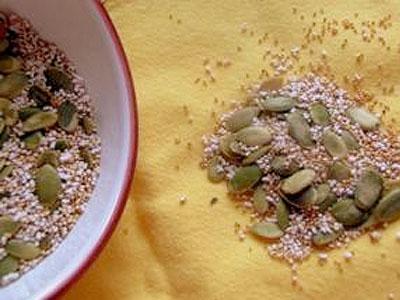Amaranth May Have Cancer-preventing, Anti-inflamatory Properties
Molecular biologists in Mexico set out to study the bioactive peptides in amaranth and, in 2008, were the first to report presence of a lunasin-like peptide in the protein in amaranth. Lunasin is a peptide previously identified in soybeans and is widely thought to have cancer-preventive benefits as well as possibly blocking inflammation that accompanies several chronic health conditions such as diabetes, heart disease, and stroke. Additional bioactive peptides in amaranth protein were found to have antihypertensive properties.
Journal of Agricultural and Food Chemistry, February 27, 2008; 56(4):1233-40. Epub January 23, 2008.






